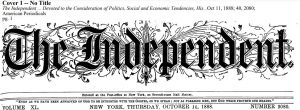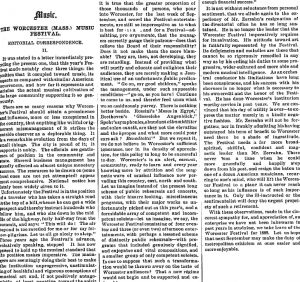A letter throws shade at the managers, even name dropping the director, of a music festival in the late 1880’s for programming outdated pieces of music. What does this say about striving for educational and musical growth when in positions of power and responsibility?
In this second letter of an editorial correspondence, titled “The Worcester (Mass.) Music Festival” from “The Independent”, the author criticizes the management of mostly unnamed managers of the Worcester Music Festival in Massachusetts (not to be confused with the Worcester Music Festival in Worcester, England). The Worcester Music Festival, according to the letter, is an important musical event that the local community of Worcester, Massachusetts, is proud of, having garnered national attention as well as drawing in money to and from the community. The reasoning behind the criticism is due to repeatedly programming older musical pieces and ignoring changing “tastes of our epoch”. The letter pointedly names “Mr. Zerrahn”, seemingly the conductor and director of the festival at the time, and that the management of the festival failed to take up the responsibility to improve the festival by evolving their musical programming. The letter goes on to claim that the management instead chooses to program pieces that have, in the past, brought in money, referencing pieces by composers of the late 1700’s and early 1800s such as Rossini, Beethoven, and Spohr.
The letter additionally argues that the festival managers undermine the knowledge and “taste” of the people of Worcester, but asserts that the audience and community members of the festival hold valuable opinions and tastes which have “considerably advanced.” Even if the audience were “imperceptive as to what is best for them,” the letter states that the festival would have failed to uphold the responsibility of continuously advancing and educating the community musically. Neither are they changing the set up and programming to be more responsive to the needs of the audience since they acknowledge their complacency in management.
It’s clear that this editorial correspondence places the people in charge of this festival under critical examination albeit discourteously. Without context of the programming or recorded management of the festival that the letter speaks about, I can neither agree nor disagree with the argument that Zerrahn should have stepped down as director sooner. It’s also questionable as to what the author means when they say that the audiences’ taste in music has “advanced”. However, I hold fast to the overarching message – music consumption and engagement is ever evolving, and our presentations of music should reflect this. Conversations and arguments of similar topics brought up in the letter have existed into the present– advocacy for change in music to better reflect and platform contemporary or underrepresented composers, creators, and audiences; challenging the use of classical works of art as a means of setting expectations in art, music or literature (take for example, the use of the Western Canon); pursuing financial stability as a musical program and what it takes or sacrifices.
As educators, learners, audience members, and consumers of music, we should question complacency and reasoning in our musical programs and conversations. Who in our audience are we reflecting when we continuously program and platform the same classicals? Even despite audience approval and acceptance of these programs, what does repetition say about what and whose music we value enough to listen to and perform? Almost a century and a half later, we should be asking the same questions and continue to be critical of the underlying messaging that is sent through what music we platform through performance and education.
Works Cited:
Music.: THE WORCESTER (MASS.) MUSIC FESTIVAL. EDITORIAL CORRESPONDENCE. II. (1888, Oct 11). The Independent …Devoted to the Consideration of Politics, Social and Economic Tendencies, History, Literature, and the Arts (1848-1921), 40, 7. Retrieved from https://www.proquest.com/magazines/music/docview/90382422/se-2
Cover 1 — no title. (1888, Oct 11). The Independent …Devoted to the Consideration of Politics, Social and Economic Tendencies, History, Literature, and the Arts (1848-1921), 40, 1. Retrieved from https://www.proquest.com/magazines/cover-1-no-title/docview/90430437/se-2


